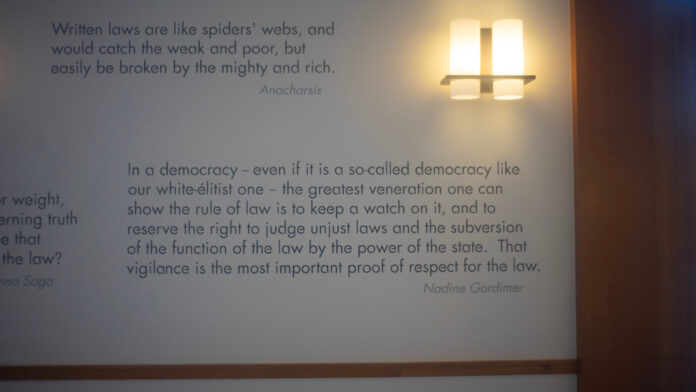
Late on Saturday night, 91 Harvard Law School voting faculty members released “A Letter to Harvard Law School Students.” In a letter penned in their individual capacities, the professors write that “American legal precepts and the institutions designed to uphold them are being severely tested[.]”
The letter does not name any of those “government leaders” who have threatened the rule of law, but cites two recent worrying trends: Threats against lawyers and law firms, and actions inciting “fear of imprisonment or deportation for lawful speech and political activism” for international students. The faculty writes that “we share a conviction that our Constitution, including the First Amendment, was designed to make dissent and debate possible without fear of government punishment. Neither a law school nor a society can properly function amidst such fear.”
In “dissent”to the letter, Professor Adrian Vermeule penned “An Open Letter To My Students” in The New Digest, a substack for essays on the classical legal tradition and common good constitutionalism (which Vermeule defines as a legal theory for which “the central aim of the constitutional order is to promote good rule, not to ‘protect liberty’ as an end in itself”).
“It would be easy to offer essentially procedural and putatively neutral objections to the collective letter,” Vermeule writes. He attacks how the open letter acts as a “consensus statement” and the effect that may have on conservative students or students who oppose Trump but do not agree with the fears conveyed in the open letter. (HLS website lists 141 individuals between their HLS Professors and Emeritus Professors – 91 signed the Saturday letter).
“The central vice of the collective letter, then, is that it is tendentious[,]” writes Vermeule, and asks where Harvard professors were in defending Rudy Guliani and John Eastman. “Just as the scholastics of the Middle Ages could, while agreeing that the truth is unitary and discernible, structure their doctrinal debates so that all could participate in deliberation about truth on impartial terms, so too within the space of the classroom.”
In a certain sense this is true —the faculty open letter all but names Donald Trump and his DOJ— but it did not mention any specific instances in which lawyers, students, or institutions have been attacked. The central thrust of the open letter was also on acute attacks against the rule of law, which in principle is detached from and limits political actions. That said, the faculty open letter discussing international student fears was likely referencing Tufts PhD student Rumeysa Ozturk who was detained by masked ICE officials in Somerville last week, or to the deportation of Columbia student Mahmoud Khalil or Brown Professor Dr. Rasha Alawieh. The references to law firms may mean the capitulation of Paul, Weiss and Skadden to the Trump DOJ’s repeated threats to lawyers who challenge administration policies.
The tenor of the moment was tangibly reflected by a recent on-campus controversy surrounding posters. Last week, two signs reading: “I am a green card holder who loves America[.] I will never be deported[.] Are you?” and “Don’t be a Mahmood Khalil[.] Be a racist if you want, Just [sic] keep it to yourself. #JFB (Jews fight back)” went up on a light post outside the WCC. On March 27th, two days after the first such poster went up, the HLS Administration sent an email claiming the individual was not affiliated with HLS. Betar, a self-described group of “Loud Proud Zionist Activists,” took responsibility for the posters in a post on X (formerly known as Twitter) last week. The administrators wrote to “condemn this and other acts that aim to intimidate and sow discord,” promising to remove “unauthorized materials of this nature.”
These letters come at an especially tumultuous time for Harvard. On Monday, the Trump administration announced a review of billions in federal funding for the school. Professors at the College, who distributed a similar open letter as the HLS faculty, are pushing Harvard administrators to stand against the federal government. The letters also came after Harvard dismissed the directors of the Center for Middle Eastern Studies.
But Alan Garber, PhD ‘82, Harvard’s president, said in a university-wide email that the school would “engage with members of the federal government’s task force to combat antisemitism.” “We fully embrace the important goal of combating antisemitism, one of the most insidious forms of bigotry,” Garber wrote, and emphasized that “Much is at stake here.”
And much is at stake – for students, their visas, community, funding, and jobs; for professors, their commitment to academic freedom, clinical work, and research; and for Harvard, billions of dollars in federal funds.
Read the full letters here: HLS Faculty, “A Letter to Harvard Law School Students.” Adrian Vermeule, “An Open Letter To My Students.”

